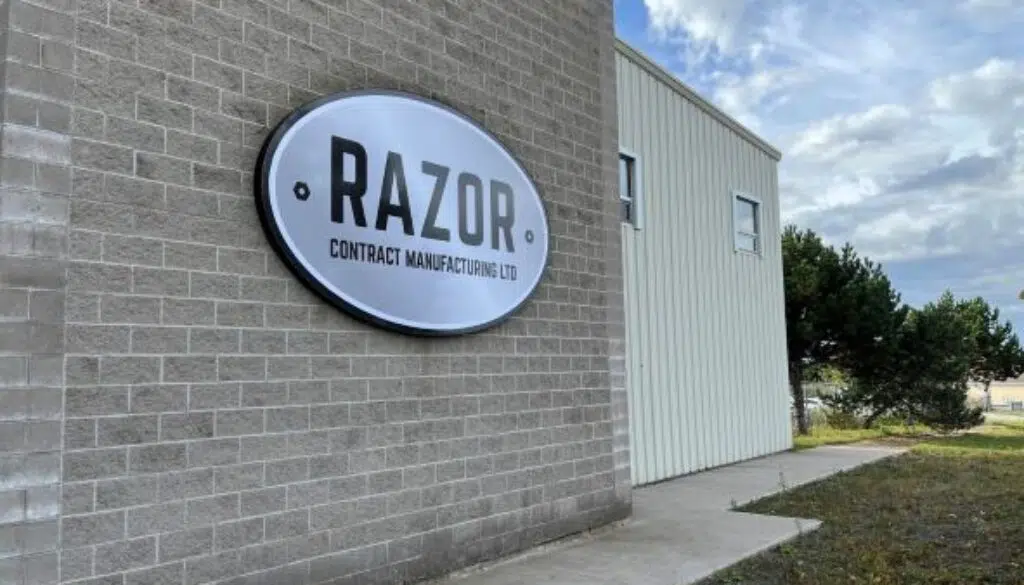A robotic welder might not be on everyone’s gift wish list, but it’s exactly what Allan Morris, the CFO of Razor Contract Manufacturing, had been hoping for.
The local metal-cutting business has received financial support to increase production capacity and bolster its workforce by 29 people. The announcement was made on October 14 at Razor’s 35,000-square-foot facility in the McAllister Industrial Park.
Razor specializes in fabricating and laser cutting metals like carbon steel, stainless steel, and aluminum, which it does primarily for the aerospace industry.
Razor will receive more than $1.5 million in loans and payroll rebates from the federal and provincial governments, some of which will be used to buy a robotic welder.
“It’s a lot more clean welding because of the steady hand,” says Morris. “It’ll allow us to do a lot more output of products. But, at the same time, it is going to give us the capability of making products that some of our guys are not qualified to do.”
High-skilled welding costly
Morris says a combination of the high cost of training and low demand for skilled welding products has prevented Razor from making the jump to increasing their highly skilled welding production. The robotic welder will remove those high training costs while being able to work on a smaller scale until demand picks up.
“But at the same time, it gives us an added welder that we can operate multiple hours of the day,” Morris continues. “I’m not going to work one of my employees 12-14 hours but I can operate this machine that long, maybe over two shifts. So that does give us that increase in capacity without having to put too much burden on one employee.”
That increased production will mean 29 new employees at Razor. Welders, general labourers, draftspeople, logisticians, and quality assurance testers are positions the company intends on filling in the months ahead.
Arlene Dunn, the minister responsible for Opportunities New Brunswick, announced the province’s portion of the financial contribution, $235,000 in payroll rebate assistance for the company’s workforce expansion, as well as $412,500 conditionally repayable loan for productivity improvements.
“I spent over 30 years in the construction industry and actually did visit this building in the past when it was the old sugar refinery,” Dunn noted as she made the announcement, saying that the facility had laid empty until 2010 when Razor took it over.
Wayne Long, MP for Saint John – Rothesay, was also on hand to announce a repayable contribution of $950,000 from the Atlantic Canada Opportunities Agency’s Regional Economic Growth through Innovation program.
“You’re a true success story of entrepreneurship,” he told Razor employees. “Taking risks, going for it and growing your business. I think we need more people like you in Saint John.”
Automation key to efficiency
Morris says Razor has its eye on some other pieces of equipment that increase efficiencies in the company. The laser cutting table is going to get upgraded to a fully automated self-sustaining system. He estimates this will result in “a 50-to-60 per cent increase in capacity for cutting” since the loading and unloading times will be significantly reduced as it will no longer be done by hand.
The other piece of equipment will be a robotic press brake, which Morris describes as a fully automated robot that will bend the material with no human intervention.
“It will give us a lot more efficiencies with parts that are complicated, that might take two or three people to bend,” he says. The automation will also make the metal bending more cost-efficient.
Once Razor gets these new pieces of equipment up and running, Morris says the company will be able to fulfill the demand for their existing products that they simply didn’t have the capacity for.
“We are getting an exceptionally large amount of quotes from our customers. We just can’t keep up. We’re running overtime. We’re running multiple shifts in order to do that,” he says.
The new equipment and increased workforce will allow Razor to expand in order to meet that demand.
“It gives us the ability to go after more work, and larger customers. When this equipment comes in, we’ll be able to go full steam ahead and be able to take them on 100%.”
Razor Contract Manufacturing makes products for the commercial and military aerospace industry, with a focus on ground support equipment for airlines and military planes.
Alex Graham is a reporter with Huddle, an Acadia Broadcasting content partner.







